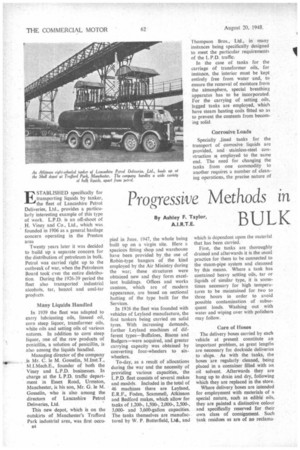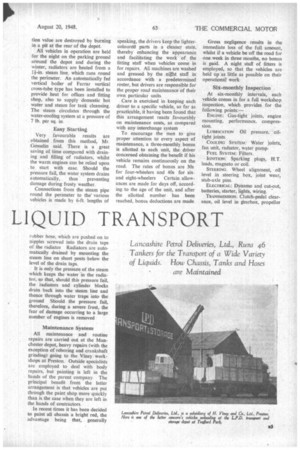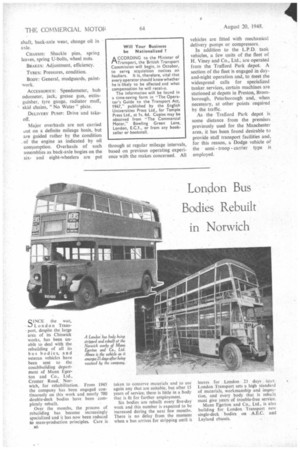Progressive Methods in
Page 40

Page 41

Page 42

If you've noticed an error in this article please click here to report it so we can fix it.
BULK LIQUID TRANSPORT
FiSTABLISHED specifically for transporting liquids by tanker, the fleet of Lancashire Petrol Deliveries, Ltd., provides a particularly interesting example of this type of work. L.P.D. is an off-shoot of H. Viney and Co., Ltd., which was founded in 1906 as a general haulage concern operating in the Preston area
Twenty years later it was decided to build up a separate concern for the distribution of petroleum in bulk. Petrol was carried right up to the outbreak of war, when the Petroleum Board took over the entire distribution. During the 1926-39 period the fleet also transported industrial alcohols, tar, benzol and coal-tar prod ucts Many Liquids Handled In 1939 the fleet was adapted to carry lubricating oils, linseed oil, corn steep liquor, transformer oils, white oils and setting oils of various natures. In addition to corn steep liquor, one of the raw products of penicillin, a solution of penicillin, is also among the liquids handled.
Managing director of the company is Mr. C. le M. Gosselin,
M.1.Mech.E., founder of both the Viney and L.P.D. businesses. In charge at the L P.D. traffic department in Essex Road, Urmston, Manchester, is his son, Mr. G. le M. Gosselin, who is also among the directors of Lancashire Petrol Deliveries, Ltd.
This new depot, which is on the outskirts of Manchester's Trafford Park industrial area, was first•occu n4 pied in June, 1947, the whole being built up on a virgin site. Here a spacious fitting shop and warehouse have been provided by the use of Robin-type hangars of the kind employed by the Air Ministry during the war; these structures were obtained new and they form excellent buildings. Offices and works canteen, which are of modern appearance, are based on sectional hutting of the type built for the Services.
In I916 the fleet was founded with vehicles of Leyland manufacture, the first tankers being carried on solid tyres. With increasing demands, further Leyland machines of different types—Buffaloes, Bisons and Badgers—were acquired, and greater carrying capacity was obtained by converting four-wheelers to sixwheelers.
To-day, as a result of allocations during the war and the necessity of providing various capacities, the L.P.D. fleet consists of several makes and models. Included in the total of 46 machines there are Leyland, E.R.F., Foden, Scammell, Atkinson and Bedford makes, which allow for tanks of 1,200-, 1,500-, 2,000-, 2,500-, 3,000and 3,600-gallon capacities. The tanks themselves are manufactured by W. P. Butterfield, Ltd., and
which is dependent upon the material that has been carried.
First, the tanks are thoroughly drained and afterwards it is the usual practice for them to be connected to the steam-pipe system and cleansed by this means. Where a tank has contained heavy setting oils, tar or liquid of similar type, it is sometimes necessary for high temperatures to be maintained for two to three hours in order to avoid possible contamination of subsequent loads. Washing out with water and wiping over with polishers may follow.
Care of Hoses The delivery hoses carried by each vehicle at present constitute an important problem, as great lengths are necessary for dockside deliveries to ships. As with the tanks, the hoses `are regularly cleaned, being placed in a container filled with an oil solvent. Afterwards they are hung up to drain and dry, following which they are replaced in the store.
Where delivery hoses are intended for employment with materials of a special nature, such as edible oils, they are painted a distinctive colour and specifically reserved for their own class of consignment. Such tank residues as are of no reclama.
rubber hose, which are pushed on to nipples screwed into the drain taps of the radiator Radiators are automatically drained by mounting the steam line on short posts below the level of the drain taps.
It is only the pressure of the steam which keeps the water in the radiator, so that, should this pressure fail, the radiators and cylinder blocks drain back into the steam line and thence through water traps into the ground Should the pressure fail, therefore, during a severe frost, the fear of damage occurring to a large number of engines is removed Maintenance System All maintenance and routine repairs are carried out at the Manchester depot, heavy repairs (with the exception of reboring and crankshaft grinding going to the Viney workshops at Preston Outside specialists are employed to deal with body repairs, but painting is left in the hands of the parent company The principal benefit from the latter arrangement is that vehicles are put through the paint shop more quickly than is the case when they are left in the hands of contractors In recent times it has been decided to paint all chassis a bright red, the advantage being that, generally shaft, back-axle wear, change oil in axle.
CHASSIS: Shackle pins, spring leaves, spring U-bolts, wheel nuts. BRAKES: Adjustment, efficiency.
TYRES: Pressures, condition.
BODY: General, mudguards, paintwork.
ACCESSORIES: Speedometer, hub odometer, jack, grease gun, extinguisher, tyre gauge, radiator muff, skid chains, "No Water" plate.
DELIVERY PUMP: Drive and takeoff.
Major overhauls are not carried out on a definite mileage basis, but are guided rather by the condition of the engine as indicated by oil consumption. Overhauls of such assemblies as back-axle bogies on the sixand eight-wheelers are put through at regular mileage intervals, based on previous operating experience with the makes concerned. All vehicles are fitted with mechanical delivery pumps or compressors.
In addition to the L.P.D. tank vehicles, a few units of the fleet of H. Viney and Co., Ltd., are operated from the Trafford Park depot. A section of the fleet is engaged in dayand-night operation and, to meet the widespread calls for specialized tanker services, certain machines are stationed at depots in Preston, Bromborough, Peterborough and, when necessary, at other points required by the traffic.
As the Trafford Park depot is some distance from the premises previously used for the Manchester area, it has been found desirable to provide staff transport facilities and, for this reason, a Dodge vehicle of the semi troop carrier type is employed.






















































































